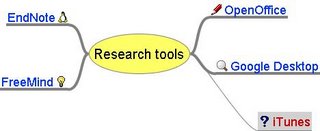5 essential research software tools

Whether you are doing a school project, or a final year thesis, you would normally use internet to find the information and resources you need. Once you get all the informations you think are important, then what?
It's a good idea to start a bit organized. You would need a plan. Okay, you don't need a software to write a plan. A piece of paper and an old dull pencil would be just the right stuff to start with. But however, using (1) Microsoft Word or OpenOffice Writer 2.0 won't cause you any harm either. Jot down anything you have in mind on a new fresh document. I know it's better to actually use a paper and pencil instead of a keyboard and a text editor, but because i am talking about software tools in this post, i'll suggest you to use them anyway :) Another obvious reason why i put these text editors as the number 1 research tool is that you would eventually need it to type your research report, sooner or later...
Now you have got a fair enough plan. What you do next would probably browse the internet for information and materials for your study or whatever research you are doing. My favorite way to start searching the Net is to type in a keyword of my problem to Google.com. The next thing that would happen is that you ge thundreds, if not thousands of links to all potential sources of valuable information. Naturally, you would then open many of those links and save many of the articles to your harddrive for later viewing. Chances are, your folders would become a bit messy with hundreds of files you have downloaded. That's where (2) Google Desktop proves to be life-saving. This handy dandy program will index and be able to search any keywords within documents of any filetypes such as *.doc, *.pdf, *.xls, *.ps, *.html, etc in your computer. Say goodbye to "where did i put my file about ****" problem :) No matter how messy your file organisations are, retrieving your file back when you need them will no longer be a problem.
After sufficient amount of information had been collected, it is now time to sort out your informations and map them into a presentable format which is easier to remember. This kind of method is now popularly known as a Mindmap(r), proposed by Tony Buzan. Certainly you can always draw a mindmap yourself on a plain paper with colorful pencils or markers. But, yes... you can draw a mindmap on your computer if you wish. And you can do it fairly easily on your beloved computer using (3) Joerg Mueller's FreeMind Mindmap(r) software.
One other software that i find so useful is (4) EndNote version 9 which i got for free from my Uni. What it does is it manages all bibliographical information of the resources you collected and potentially use on your research or thesis. You can easily add entries to its database using standard bibliographical entry formats from journal databases such as ACM Portal, IEEExplore, ProQuest, etc. You can always type in a piece of reference source entry manually if you do not mind the hassles of doing so. So what's so special about EndNote? This program can automatically format the document you are typing so that it complies with any referencing style that you are supposed to use. For example, articles written for the IEEE normally cites another work using numbers in square brackets, and at the end of the paper, the reference list is also numbered in square brackets which are refered to in the text. If you wish to change this referencing style to APA for instance, all you need to do is tell EndNote to change the style. Another good thing about EndNote is that the references in your database can be represented as an anotated bibliography with the abstract of every articles included.
The last thing you need is (5) iTunes (the current version now is 6) haha. It is important, my dear friends! It can be awfully quiet inside your lab or room where you work in, and this quietness will definitely make you sleepy, and you don't want this to happen would you? If you enjoy music, listening to them while doing your research work would hopefuly be enjoyable as well :D And why choose iTunes instead of Winamp or WMP for instance? The reason is that in iTunes you will be able to search much easier, you can also share your music to other iTunes on your local network, you can open the music store easily, and you can download podcasts of your favourite radio shows for free.
That's all five software that i strongly suggest you to have in your computer for research purposes. And the good news is that all of them are FREE except Microsoft Word and EndNote. For Endnote, you must pay the license if you are not a student or staff at my uni haha. An alternative to EndNote is the open-source program called Bibus, but i still can't get the hang of it. Next time i'll probably try to post about 5 most important sites for research :)
Links:
(1) OpenOffice Writer 2.0
(2) Google Desktop *
(3) Joerg Mueller's FreeMind Mindmap(r) software
(4) EndNote version 9
(5) iTunes
* i had just recently been advised that there are some potential security issues concerning the usage of google desktop (GDS) on your computer. Vital informations from your computer may be read by unauthorised access through google desktop indexing share feature. Therefore i believe that turning on the encryption feature for google desktop's index file is a good thing to do, and activating your google desktop sharing feature would be rather dangerous -- try to avoid it. Nevertheless, i couldn't imagine working on my thesis without GDS. It is too important.




0 Comments:
Post a Comment
<< Home